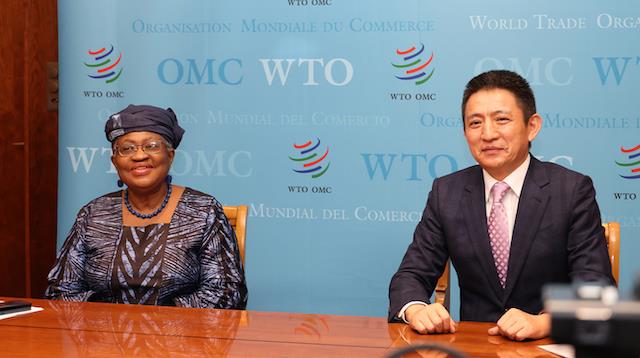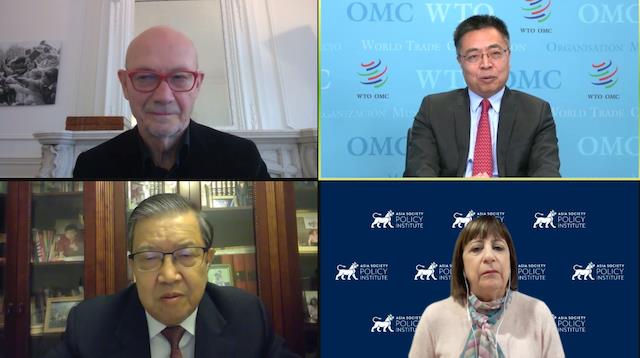China’s accession to the World Trade Organization (WTO) in 2001 was "a key event in the history of the multilateral trading system". WTO Director-General Okonjo-Ivera said that in the past 20 years, China has been "a textbook case of how to promote growth and development in global trade integration — — The economic rise of China has lifted millions of people out of poverty, not only in China, but also among the trading partners of developing countries. "
On December 10th, local time, the WTO Secretariat and the Permanent Mission of China to the WTO jointly held a high-level forum in Geneva to commemorate the 20th anniversary of China’s accession to the WTO. Okonjo-Ivera made the above statement when attending the meeting.
Ambassador Li Chenggang, Permanent Representative of China to the WTO, said that China will continue to firmly support the multilateral trading system and hopes that the 12th Ministerial Conference (MC12) in the future can "achieve meaningful results in some key areas, such as fishery subsidies and the response to the COVID-19 pandemic."
Looking ahead, he added: "In order to revitalize the key functions of the WTO, while maintaining its core values and principles, China supports the necessary reforms and is willing to work together with other members to this end."
On the 9th, at the regular press conference of the Ministry of Commerce, Gao Feng, a spokesman for the Ministry of Commerce of China, told the First Financial Reporter that in terms of opening up the market, China has greatly reduced its tariffs, and the total level of import tariffs has been reduced from 15.3% to 7.4%, which is lower than the commitment of 9.8% to join the WTO.
"The China government has kept its promises and fully fulfilled its accession commitments, which has been fully affirmed by the Director-General of the WTO and the vast number of members." Gao Feng said that the China government will continue to firmly support the multilateral trading system with the WTO as its core, maintain its position as the main channel for international rule-making, actively participate in WTO reform, safeguard the legitimate rights and interests of developing countries, support the WTO to play a greater role and promote the inclusive development of the multilateral trading system.

Source: WTO website
With China’s entry into WTO, WTO has become a real "world organization".
After 15 years of WTO accession negotiations, China joined the WTO on December 11th, 2001, becoming its 143rd member.
"The structural transformation triggered by the reform related to China’s accession to the WTO has promoted the strong growth and modernization of China." Okonjo-Ivera said.
For the WTO, welcoming China marks an important step towards becoming a real world organization, with more than one-fifth of the world’s population — — 1.3 billion producers and consumers — — Fully entered the multilateral trading system. "For other WTO members, China’s accession means a commitment to establish more predictable and mutually beneficial trade relations with a huge and fast-growing economy," she said.
China’s gross domestic product (GDP) was US$ 1.3 trillion in 2001, according to Okonjo-Ivera. By 2020, it has reached $14.7 trillion. The International Monetary Fund (IMF) predicts that China’s economy will grow by 8% in 2021 and 5.6% in 2022.
At the same time, Chinese’s living standards have improved significantly. In terms of purchasing power, the per capita income has risen from about $3,400 in 2000 to $16,200 in 2020. Extreme poverty has almost been eliminated. She said that China is the main destination of foreign direct investment and has become an important source of foreign investment. China’s stock of foreign direct investment has increased tenfold — — From about 200 billion dollars in 2000 to nearly 2 trillion dollars in 2020. At the same time, China’s stock of foreign direct investment soared to $2.3 trillion, an increase of 84 times compared with China’s entry into WTO.
Li Chenggang said: "We have seen great changes. With China’s entry into WTO, China has substantially opened its market for goods and services. The average tariff rate of manufactured goods has dropped from 14.8% to the current 7.4%— — 2.8% lower than the WTO commitment. In terms of trade in services, nearly 120 sectors have been opened, 20 more than those agreed upon at the time of accession. Constant opening and reform have fundamentally promoted the development of China. In the past 20 years, China has developed from the sixth largest economy in the world to the second largest economy in the world, and its GDP has increased 11 times, reaching nearly 15 trillion US dollars. "
Zhou Shijian, executive director of the WTO Research Association in China and a senior researcher at the China-US Relations Research Center in Tsinghua University, participated in the relevant work during the WTO accession negotiations.
He told the First Financial Reporter: "China’s accession to the WTO means integration into the global trading family and trade activities under the guidance of the same world trade rules, which is also a key step for China’s economy to integrate into the world."
Zhou Shijian said that at that time, China’s accession to the WTO meant that China suddenly became 1/143, enjoying the most-favored-nation treatment with each other, and "China’s goods with good quality and low price will have their place".
Zhou Shijian added that at the same time, the process of China’s entry into the WTO as a whole is also a process of promoting domestic reform by opening to the outside world, which involves the reform of enterprises, markets and legal provisions, which is also a very important point in the significance of entering the WTO.
According to the data of the Ministry of Commerce, China has basically completely lifted the restrictions on foreign investment in the manufacturing sector, relaxed the restrictions on foreign investment in agricultural sectors such as seed industry, and continuously expanded the opening up of service sectors such as finance, telecommunications, construction, distribution, tourism and transportation. Among the 160 branches of the WTO service trade classification, China has opened nearly 120.
US and European negotiators support China’s entry into WTO.
The forum also invited three negotiators from China, the United States and Europe who participated in China’s WTO accession, namely Long Yongtu, former Vice Minister of Foreign Trade and Economic Cooperation and chief representative of China’s WTO accession negotiations, former WTO Director-General (2005-2013), former EU Trade Commissioner Lamy and former US Deputy Trade Representative (USTR) Cutler.
Lamy said that China’s accession to the WTO and the multilateral trading system is a "decisive moment", and China’s commitment and participation in the WTO in the past 20 years is worthy of recognition.

Source: meeting screenshot
Cutler, on the other hand, emphasized the historical importance of China’s accession to the WTO, and pointed out that more time was needed to comprehensively assess its impact: "When we review the history of trade, it will be an important milestone in trade. But I don’t think this story is static. "
Cutler also questioned those voices that claimed that it was wrong to support China’s entry into WTO. "I think (China’s accession to the WTO) is the right decision made at the right time."
In the eighth WTO trade policy review on China earlier this year, there were some comments that China has not fully fulfilled its commitments when it entered the WTO.
On October 28th, Wang Shouwen, Vice Minister of Commerce and Deputy Representative of International Trade Negotiations, said at a press conference that when China joined the WTO, it had a protocol on accession and a report of a working group on accession. These two documents stipulated China’s obligations after its accession to the WTO and set a timetable for China to fulfill its WTO obligations.
"If you compare this timetable, you will see that we have fully fulfilled China’s obligations under the WTO and our commitments have been fully fulfilled." He said, "In this regard, several successive WTO Directors-General and most WTO members have fully affirmed and generally recognized this."
This time, Lamy also gave China an "A+" evaluation on fulfilling its WTO commitments, and he also insisted on this view at this meeting. And said, "I personally think that the problem is not the difference between China’s commitment and China’s implementation, but the difference between WTO rules and spirit".
He also said that if China fails to abide by its commitments, it will be brought to a dispute (settlement mechanism) because the WTO has a strong dispute settlement mechanism.
"Sometimes China will win, and sometimes China will lose. We have such a mechanism that allows countries to confirm whether they have fulfilled their commitments by interpreting text rules. Therefore, I gave A+. " He said.
"But if you are concerned about the spirit of WTO rules, the situation is different." Lamy said that in some cases, the rules of the WTO are still quite unclear and vague. They set a principle, but they don’t always explain the process behind it or the responsibilities they have to do in detail. This is the case with subsidies, for example. In my opinion, there is too much ambiguity between the spirit and the text of the Agreement on Subsidies and Countervailing Measures (ASTM). Lamy said, "Therefore, I think this is not a problem for China, but a problem for the WTO. In some cases, we need WTO rules to be clearer and stronger. "
"Whether a member has fulfilled its commitments in the WTO is also related to whether it has fulfilled its responsibilities and whether it has actively helped the WTO move forward." Lamy added that at present, China has participated in the recently reached joint statement on domestic regulation of service trade: this is a sign that many other emerging economies have not joined, but China has, so China has played its responsibility and leadership.
Long Yongtu, on the other hand, said that he has seen encouraging signs that China wants to solve problems such as environment, industrial subsidies and state-owned enterprises.
He said that although the WTO is facing difficulties, it should still be the main channel for formulating new rules based on consensus: "We must emphasize to the world that the WTO should be a strong and efficient organization. Frankly speaking, the WTO is in a very difficult period and there is a trend of fragmentation. I think the most important thing is to build the confidence of the international community in the WTO, because only through this confidence can the WTO carry out substantive reforms to improve its rulebook and adapt to current and future challenges. "
关于作者